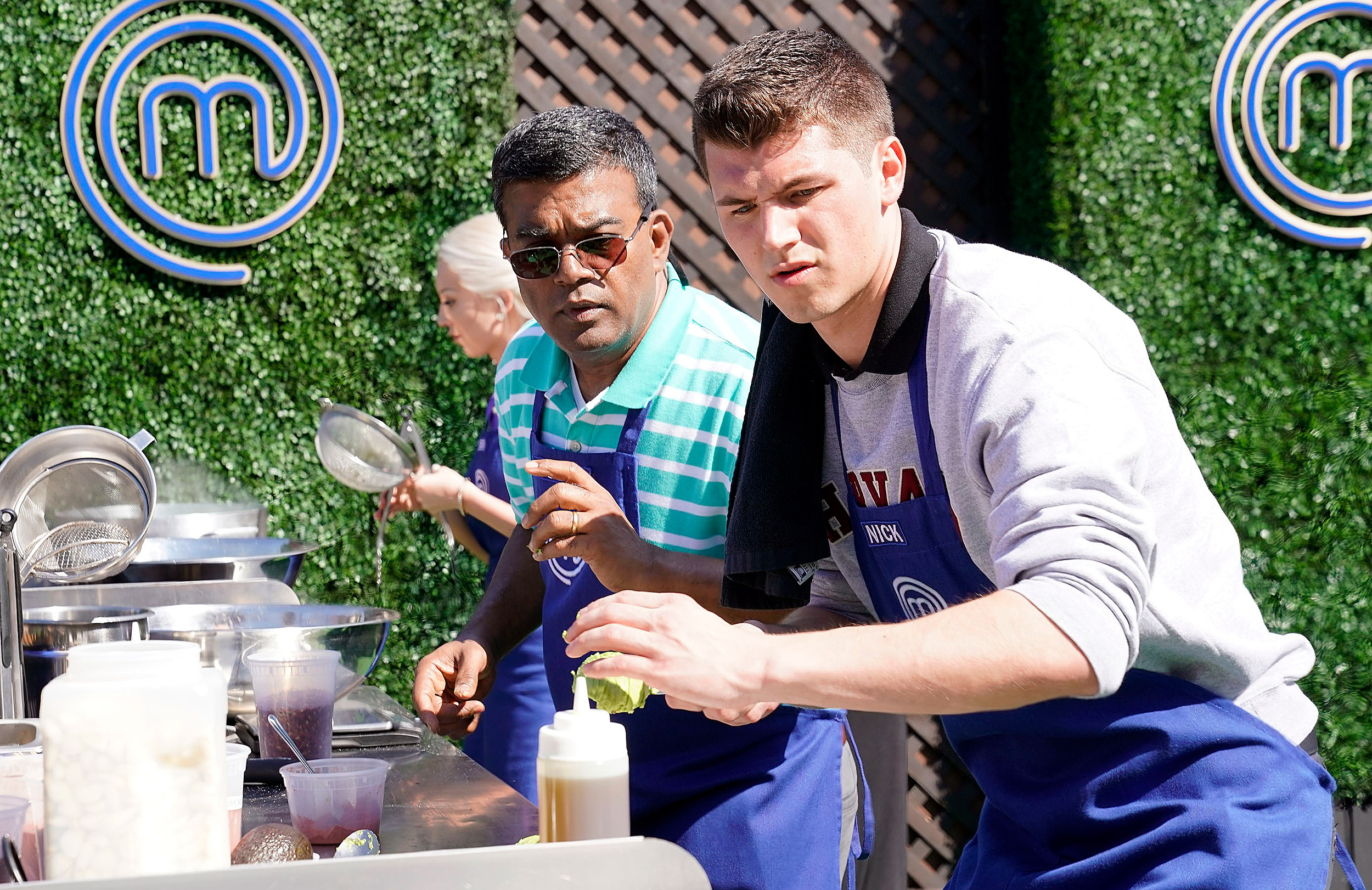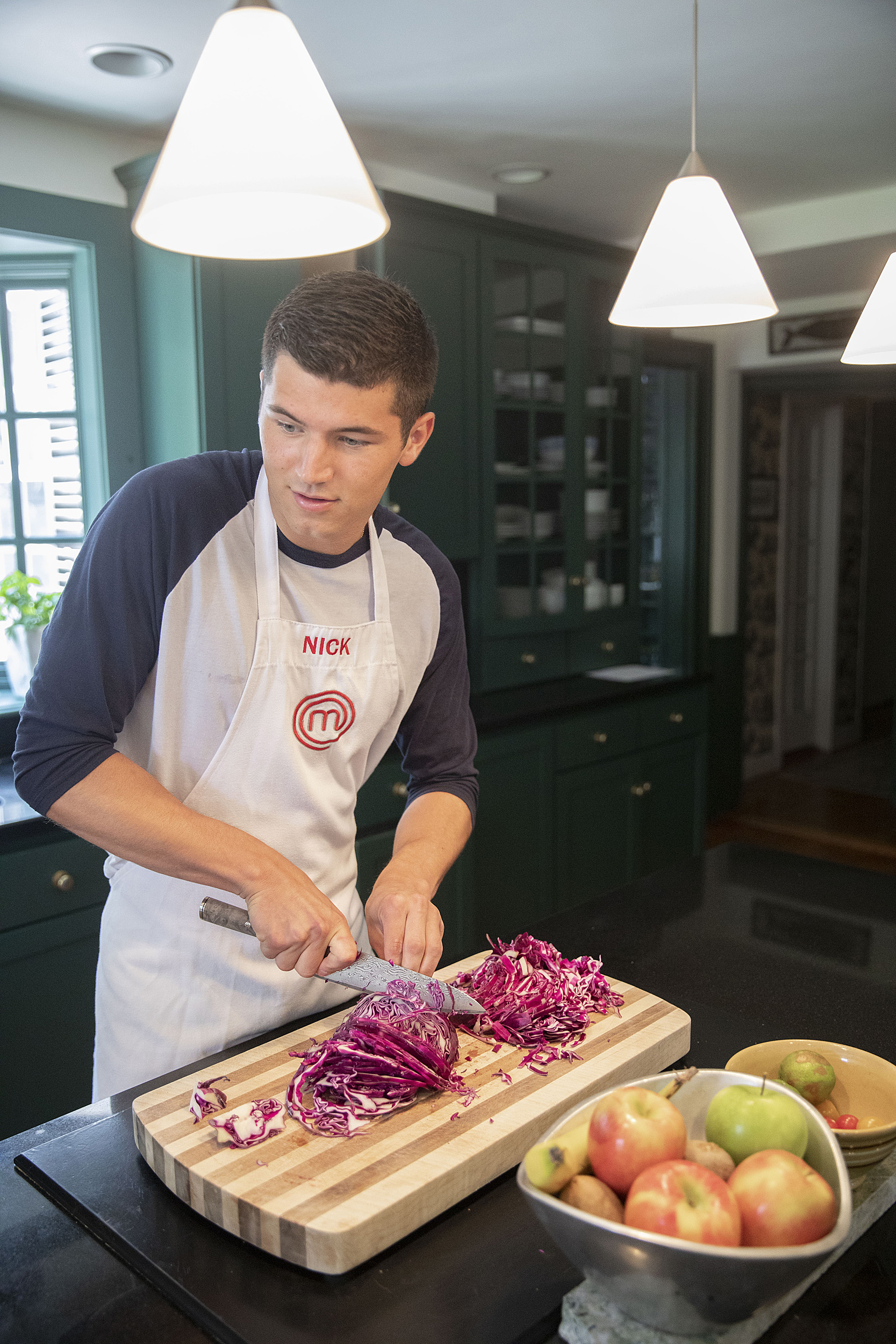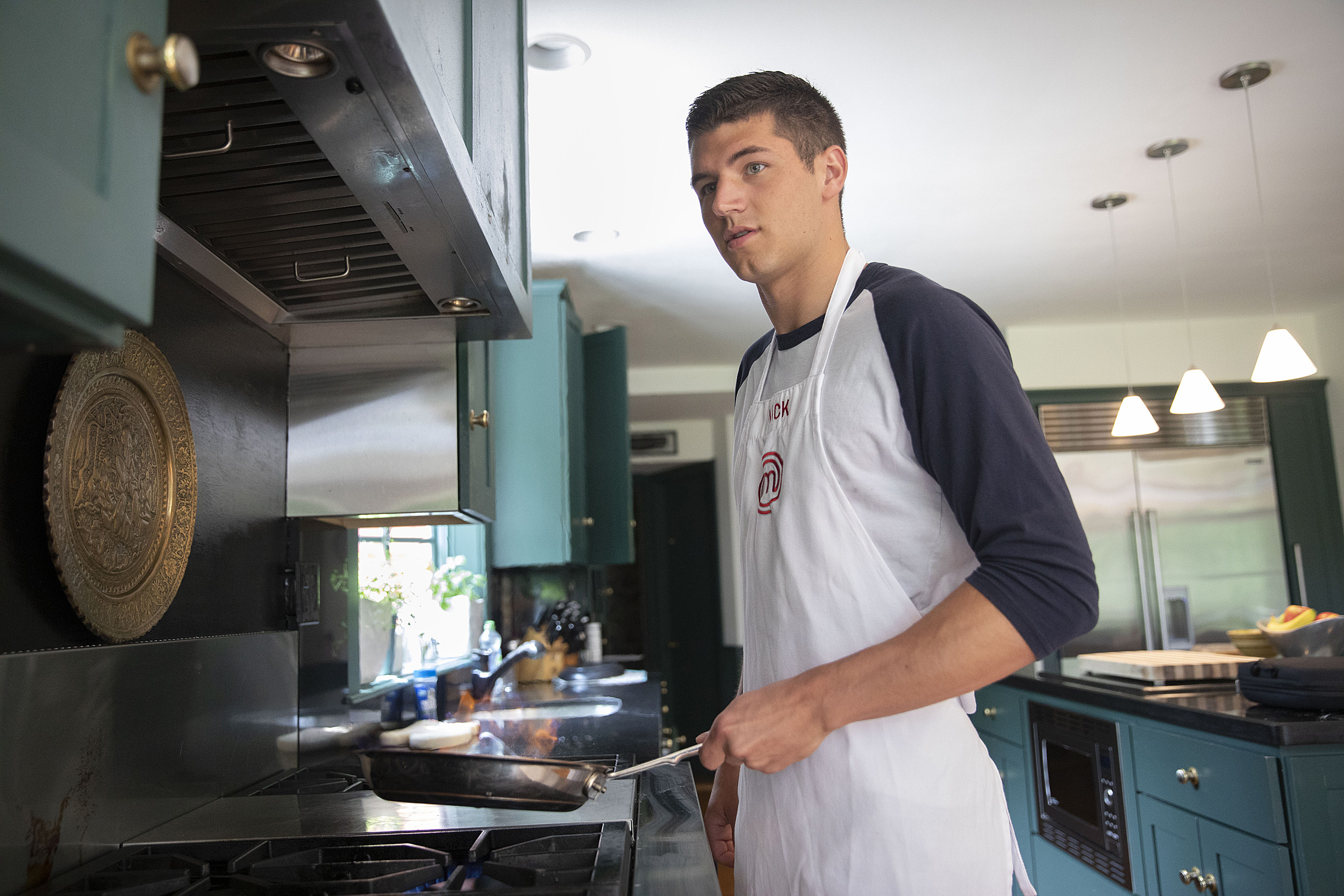
Contestants Subha Ramiah (left) and Nick DiGiovanni cooking on the set of “MasterChef.”
© 2019 FOX MEDIA LLC. Greg Gayne/FOX
Cooking up a TV career
Recent grad Nick DiGiovanni competes on ‘MasterChef’
The night before his September audition for Season 10 of the reality cooking-competition show “MasterChef,” Nick DiGiovanni ’19 was lying on the floor of his room in Quincy House, thinking up a meal that would earn him a spot and pay homage to his Italian and Persian heritages.
“I grew up eating both kinds of cuisine, and I like making new things every time I cook,” he said. “I hate recipes and love going into a kitchen, taking random things, and putting them together.”
He had never made lamb ravioli with whipped lemon crème fraîche and mint oil before, but his late-night concept won him a coveted white apron on May 29 — and a spot in the top 20 of the hit FOX TV show. It also solidified his commitment to a life in the world of food.
Growing up in Barrington, R.I., DiGiovanni loved watching his grandmother cook elaborate meals for family gatherings and discovered a creative workaround to his mother’s prohibition on junk food in the house.
Around age 8 or 9, I realized that if I asked my mom for junk food she wouldn’t buy it, but if I asked her for raw ingredients she would,” said DiGiovanni. “The first thing I bought ingredients for and made myself was a lemon meringue pie, and it actually worked, even though I probably messed up the meringue a few times.”
DiGiovanni cultivated his deepening interest in cooking throughout his high school years, but once he started College other activities took over: participating on the Harvard sailing team, getting settled in the Yard, and adjusting to a full course load. After a whirlwind first semester, he felt a little unmoored.
“When I got here, I didn’t really know what to do or how everything worked,” he said. “I went over the list of concentrations so many times, and I couldn’t find one that I wanted to do.”
The answer came during “Science & Cooking: From Haute Cuisine to Soft Matter Science,” a general education course taught by Mallinckrodt Professor of Physics and Applied Physics David Weitz and senior preceptor in chemical engineering and applied materials Pia Sörensen. DiGiovanni realized he didn’t need to leave his culinary interests behind. Instead, they could become his focus.
Harvard didn’t offer a concentration in food studies, so DiGiovanni decided to create his own: food and climate. He and Sörensen embarked on a long, complex process of building a program of study from the ground up and submitting a petition to the Standing Committee on Special Concentrations for approval.
“By design, the process of creating a special concentration is very student-driven. Nick was very determined and had the courage to reach out to diverse stakeholders to assist him,” said Sörensen. “The food issue was already in front of us, but one challenge was what angle to approach the topic from. We thought of climate and the environment, and the role of the chef when they have a public voice, and asked, ‘How do you tell this story with food?’”
The petition was rejected at first, but DiGiovanni refused to give up.

Harvard University

Harvard University
Nick DiGiovanni cooks at his home in Milton.
Kris Snibbe/Harvard Staff Photographer
“Harvard is very traditional, and food is a pretty new field of study. After all that work, I just knew that I wanted to do it,” he said. “So, I kept fighting.’’ Eventually, he succeeded.
His proposal incorporated coursework in chemistry, climate science, anthropology, public health, and the business of food. And his interdisciplinary approach had DiGiovanni registering for classes at the College, Harvard Business School, Harvard Kennedy School, and Harvard T.H. Chan School of Public Health. He also did a summer internship with chef Corey Lee at Benu, a three-star Michelin restaurant in San Francisco, and worked as a line cook at Cambridge restaurant Waypoint during his sophomore and junior years.
“Restaurant work is like a sport because you have to think quickly and be a team player, otherwise the kitchen doesn’t work,” said DiGiovanni.
Crunch time came in February, when he had to submit his senior thesis before flying to Los Angeles to start filming “MasterChef.” DiGiovanni found himself enjoying the pace. “Sitting in class was always hard for me,” he said. “I’m always just ready to go. I like being super busy and having a full schedule.”
For his thesis, DiGiovanni analyzed data on carbon emissions in 36 global restaurants from Singapore to San Francisco, working closely with Sörensen and author and journalist Michael Pollan, a professor of the practice in Harvard’s Creative Writing Program.
DiGiovanni couldn’t tell anyone why he was hustling to leave in the middle of the semester and at the start of his final season with the sailing team in keeping with the rules of the show.
“The hardest choice I probably made all four years here was leaving for my senior season,” said DiGiovanni.
Once in Los Angeles, however, DiGiovanni faced other challenges.
“I had the flu during the first apron battle, and was sweating through my Harvard sweatshirt,” he recalled. “I was also going from my dorm cooking to this giant studio where there are cameras all around and people talking to me while I cooked. That first day was so exciting, and to go out and meet Gordon Ramsay and have him taste my food was a big honor.”
As of June 27, when season 10, episode 6 aired, he is still going strong.
“At Harvard, I learned a lot about drive, sticking with your gut, and going for something until you get what you’re working for,” he said. “There’s a way to do anything here, and it’s about putting in the work and asking for help — and there’s nothing wrong with that.”




